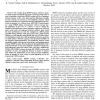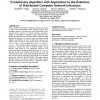419 search results - page 17 / 84 » Is a detector only good for detection |
JSA
2008
13 years 7 months ago
2008
Nowadays, there are many protocols able to cope with process crashes, but, unfortunately, a process crash represents only a particular faulty behavior. Handling tougher failures (...
ICMCS
2006
IEEE
14 years 1 months ago
2006
IEEE
Due to the diversity of different wipe effects, wipe transition is considered complex and difficult to detect. This paper identifies two common characteristics of different wipes,...
JSAC
2008
13 years 7 months ago
2008
We consider large MIMO systems, where by `large' we mean number of transmit and receive antennas of the order of tens to hundreds. Such large MIMO systems will be of immense i...
ICARIS
2007
Springer
14 years 1 months ago
2007
Springer
Today’s signature-based intrusion detection systems are reactive in nature and storage-limited. Their operation depends upon catching an instance of an intrusion or virus and en...
ECCV
2002
Springer
14 years 9 months ago
2002
Springer
This paper presents a novel approach for detecting affine invariant interest points. Our method can deal with significant affine transformations including large scale changes. Such...


